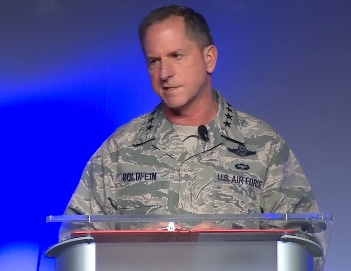
With new National Security Adviser, calls to bring back cyber coordinator to WH
In today's Federal Newscast, Congressman Bennie Thompson (D-MS), the chairman of the Homeland Security Committee, says as cyber threats become more sophisticate...
To listen to the Federal Newscast on your phone or mobile device, subscribe on PodcastOne or Apple Podcasts. The best listening experience on desktop can be found using Chrome, Firefox or Safari.
- With President Donald Trump naming Robert O’Brien as National Security Adviser, lawmakers are pressing for the return of the cyber coordinator role in the White House. Rep. Bennie Thompson (D-Miss.), the chairman of the Homeland Security Committee, said as cyber threats become more sophisticated, bringing back the cyber coordinator role is even more important. He called on O’Brien to name a new cyber coordinator as his first act in the role. Former National Security Adviser John Bolton eliminated the position into in May 2018. (House Homeland Security Committee)
- Federal employees could get more government shutdown relief. House Financial Services Committee Chairwoman Maxine Waters (D-Calif.) introduced the Protecting Innocent Consumers Affected by a Shutdown Act. The bill would prevent credit reporting agencies from including negative information about a federal employee’s financial situation during a government shutdown, and 90 days after the shutdown. The bill is under consideration in the House Financial Services Committee. It has backing from the National Treasury Employees Union.
- Agency inspectors general have given Congress a wish list of legislation to make their oversight roles easier. The Council of Inspectors General on Integrity and Efficiency, or CIGIE, requests subpoena authority, which would allow IGs to continue to question federal employees, even if they leave government. The council also recommends an exemption to the Freedom of Information Act, that would prevent the disclosure of IG probes into agency IT vulnerabilities. (Federal News Network)
- Congressional supporters of the Office of Technology Assessment, or OTA, have introduced a bill to reform the tech watchdog office, if its funding is restored. The bill would require OTA to coordinate its work with the Government Accountability Office’s new Science, Technology Assessment, and Analytics team. Members of Congress would also be able to submit tech assessment requests for OTA to evaluate. Congress zeroed out funding for OTA in 1995.
- There is no national incident response plan in case of a cyber attack and DHS wants to fix that. When cyber attackers hit seven parishes in Louisiana and 23 jurisdictions in Texas with ransomware earlier this year, the Department of Homeland Security responded. But Chris Krebs, the director of the Cybersecurity and Infrastructure Security Agency, said these two cases demonstrated more than the threat of this new attack vector. Krebs said the country needs a large scale response and resiliency doctrine like we have for natural disasters. And with the 2020 election coming, Krebs said the time is now to develop such a strategy.
- A new Cyber Warfare Flight Plan from the Air Force spells out where the service will put its cyber resources and investments over the next 10 years. The plan emphasizes human capital as one of the most important aspects, and pushes for accelerating emerging technologies, expanding offensive cyber capabilities and providing resilient communications. The plan comes as the service is merging its cyber and intelligence Air Forces into a new Information Warfare Air Force. (Federal News Network)
- The Air Force also has a new hiring process for first sergeants. The new system, known as the first sergeant assignment program, allows airmen to volunteer for the rank. Previously, it was a nomination-only process. Air Force Personnel Command will conduct two hiring cycles per year, one in the fall and one in the spring. Both cycles together will fill the seven First Sergeant Academy classes throughout the year. (Federal News Network)
- The Army said it’s met its recruiting goal for 2019. With just a few weeks left to go in the fiscal year, officials say they’ve successfully onboarded 68,000 new active duty soldiers. Although that figure is on par with the goal the Army set for 2019, it’s about 2,000 soldiers fewer than the service recruited the year before, when it missed its more-ambitious goal of 76,500. Officials said this year’s goal was more realistic in light of a strong-private sector economy and high education and fitness standards. (Army)
- Somehow, the Army managed to acquire but not get its hands on six fuel trucks worth over $1 million. But thanks to a whistleblower at Fort Rucker, Alabama, an Army investigating officer found out what happened with vendor Primus Solutions. A contracting officer with the Army Corps of Engineers failed to include a clause giving the government title to the trucks. He found the CO negligent but not to be criminal. In a letter to the Office of Special Counsel made public yesterday, the Army said it’s taking steps to straighten out the contract, and get the CO re-trained. (Office of Special Counsel)
- The national capital region celebrated the launch of the 2019 Combined Federal Campaign. The region hopes to raise $34 million this year, which would match what federal employees in the area donated in 2018. The CFC said the most recent government shutdown hurt donations last year. The campaign is hopeful federal employees will bounce back and surpass this year’s goal. The 2019 CFC runs through January 12, 2020. (Federal News Network)
Copyright © 2024 Federal News Network. All rights reserved. This website is not intended for users located within the European Economic Area.
Eric White
Eric White is news anchor and Federal Drive producer at Federal News Network.
Follow @FEDERALNEWSCAST
Related Stories
Related Topics
Agency Oversight
Air Force
Air Force Personnel Command
All News
Army
Army Corps of Engineers
Bennie Thompson
Combined Federal Campaign
Council of Inspectors General on Integrity and Efficiency
Cybersecurity
Defense
Defense News
Donald Trump
Federal Drive
Federal Newscast
Fort Rucker
Government Shutdown
Hiring/Retention
John Bolton
Management
National Security Adviser
Office of Special Counsel
Office of Technology Assessment
Robert O’Brien
Technology
whistleblower
White House
Workforce





